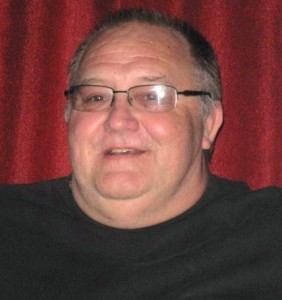By Mark L. Blackman: On the evening of Wednesday, July 15, the Fantastic Fiction Readings Series hosted readings by authors Jeffrey Ford and David Edison in the Red Room of the KGB Bar in Manhattan’s East Village. (It was probably coincidental that both authors share surnames with famous inventors — and capitalists, ironic in view of the Bar’s Soviet era-themed décor.) So it was up the steep and very narrow stairway to the 2nd floor (a bit daunting to me just a month after open-heart surgery).
The Series (http://www.kgbfantasticfiction.org/), co-hosted by Mathew Kressel and award-winning editor Ellen Datlow, has, for over a decade on the third Wednesday of the month, presented readings (always free) both by veteran speculative fiction writers and rising stars.
Customarily, as the audience settled in (readings are commonly SRO), Datlow whirled around photographing the crowd (the photos are posted on the website). The event opened with Kressel welcoming the audience, thanking the Bar (urging the crowd to buy drinks, even soft drinks – “Hydrate!”) and announcing upcoming readers: On August 19 the readers will be N.K. Jemisin and A.C. Wise (the theme must be initials); on September 16, Lawrence Connolly and Tom Monteleone; on October 21, Nathan Ballingrud and Fran Wilde; on November 18, Kathe Koja and Robert Levy; on December 16, C.S.E. Cooney and Elizabeth Hand; and looking ahead to 2016, on January 20, Ilana C. Myer and Delia Sherman. He then introduced the first reader of the evening.
David Edison’s first novel, The Waking Engine, was published by Tor in 2014, and earned Debut of the Month from the Library Journal. His next novel, The Noonday Plague, will be published in 2016, and it is from the middle of that work that he read. (It is apparently inspired – very, very loosely – by an old Scottish ballad, Tam Lin. The Waking Engine was the first book in a planned quartet – “I was tired of trilogies,” he’s said elsewhere – and, whereas it was “thematically-aligned with the morning,” this book is “aligned with the day.”) In the first selection, Tam Lin (aka Tamlin aka Tamlane) is in the Seelie Court, in the clutches of the faerie queen, Lallowe, even for a villainess, a nasty piece of work. He jumped ahead to a scene of Tam Lin and his lover, Cooper (“a queer dude from Earth”), outside a burning city. (Two bits jumped out: “[She was] murdered for her own protection” and “[a] magic crack pipe”.) Edison has a fine reading voice and held the audience rapt.
After an intermission, Datlow introduced the second and final reader. Jeffrey Ford is the author of the novels The Physiognomy, Memoranda, The Beyond, The Portrait of Mrs. Charbuque, The Girl in the Glass, The Shadow Year and The Cosmology of the Wider World, and the story collections The Fantasy Writer’s Assistant, The Empire of Ice Cream, The Drowned Life and Crackpot Palace. (He has a new story collection coming out in 2016, A Natural History of Autumn.) His fiction has won the Edgar Allan Poe Award, the Nebula, the Shirley Jackson Award, the World Fantasy Award and Gran Prix de l’Imaginaire. He likes to sit. His chosen story, “The Thousand Eyes,” was set in South Jersey in the 1960s and centered on the titular lounge’s singer, Ronnie Dunn, “the Voice of Death.” (Decrepit and barnacle-covered, he was “well-Dunn.” Ford’s descriptive turns of phrase, a couple alluding to the vicinity’s stench, had the audience chuckling through much of the piece.) No one dies there, it’s said, but people do seem to vanish forever, called by Dunn’s vocal summons. When Merle, a local artist, smuggles in a camera (a Polaroid Swinger – I still remember its jingle) and uses a photo of Ronnie as the basis of a painting, one may guess what happens. (Credulity is strained by Merle having two brilliant ideas.)
Edison’s The Waking Engine and several books by Ford were for sale at the back of the room by the Word bookstore in Brooklyn. (Datlow exhorted the audience to buy books so that there wouldn’t be any leftovers for them to have to carry back.) Much of the audience hung around for a while afterward, then an expedition headed out for dinner.


